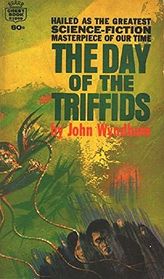Helpful Score: 2
The classic! While the story doesn't fully explore all the issues it raises, by doing so, it gives you plenty to think about.
Sentient carnivorous plants... gotta love the concept.
Sentient carnivorous plants... gotta love the concept.
Helpful Score: 1
I recall seeing a B-movie version of this novel many years ago. Based on the movie, I was thinking the novel would be a juvenile type 50's sci-fi thriller. I was very pleasantly surprised by the book! It is a very well-written novel dealing with life after a global catastrophe in which most of the world's inhabitants are blinded by a passing comet's meteor shower (although this may not be exactly the cause of the blindness). On top of the blinding, the earth is menaced by carnivorous genetically-engineered plants called Triffids. The book is concerned with how humans react to the catastrophe and their attempt to rebuild society. The novel reminded me a lot of H.G. Wells style and his novels such as War of the Worlds that also deals with global catastrophe. All in all, I thought this was a great read and would highly recommend it.
This is the first John Wyndham book I have ever read and I really enjoyed it. The story wasn't what I expected and I was pleasantly surprised to find it scarier and more in the horror genre than Sci-Fi. Yes, there are giant walking plants that are trying to kill you, but besides that, the story seemed very realistic. The plants are only a part of the story, how people survived after everyone went blind is the driving force. Even the cause of the blindness is based in truth/reality opposed to a random act of god or some cosmic source, which in my experience tends to be the cause in a lot of Sci Fi stories. Overall the story reminded me of the movie "28 Days Later". Are plants or dead people ever going to walk the Earth and try to kill/eat us? No. But just like how "28 Days Later" made you feel that zombies could exist, "Day of the Triffids" does the same for carnivorous walking plants.
Really enjoyed this book. The author moves through time rather quickly. He doesn't bog you down in the minutia of people existing and their details. Very good for a 1951 sci-fi novella.
I remember this as a movie (not a very good one at that) with a quite different ending. To annihilate ourselves this time, we don't invent a better bomb, we create a plant: one that provides a new and superior source of vegetable oil. Great! Except that it is can transplant itself, reproduces quickly, has a form of intelligence, and in its adult stage is a carnivore. Wow! Now it has spread all over the world and is taking over. And, it seems, that only bumbling old British ingenuity can stem the tide. But, can they eradicate it? This has to be one of the all-time Sci-Fi classics.
John Wyndham was British and most of his writing is set or referenced to England.
This novel is a fairly quick read, although I admit to having read it more than a few times.
Smart plant, useful to our economy, carnivorous and extremely dangerous. Humans lose control by accident and we learn a lesson the hard way.
If you are interested in science fiction and have not read this author, I do recommend.
This novel is a fairly quick read, although I admit to having read it more than a few times.
Smart plant, useful to our economy, carnivorous and extremely dangerous. Humans lose control by accident and we learn a lesson the hard way.
If you are interested in science fiction and have not read this author, I do recommend.




